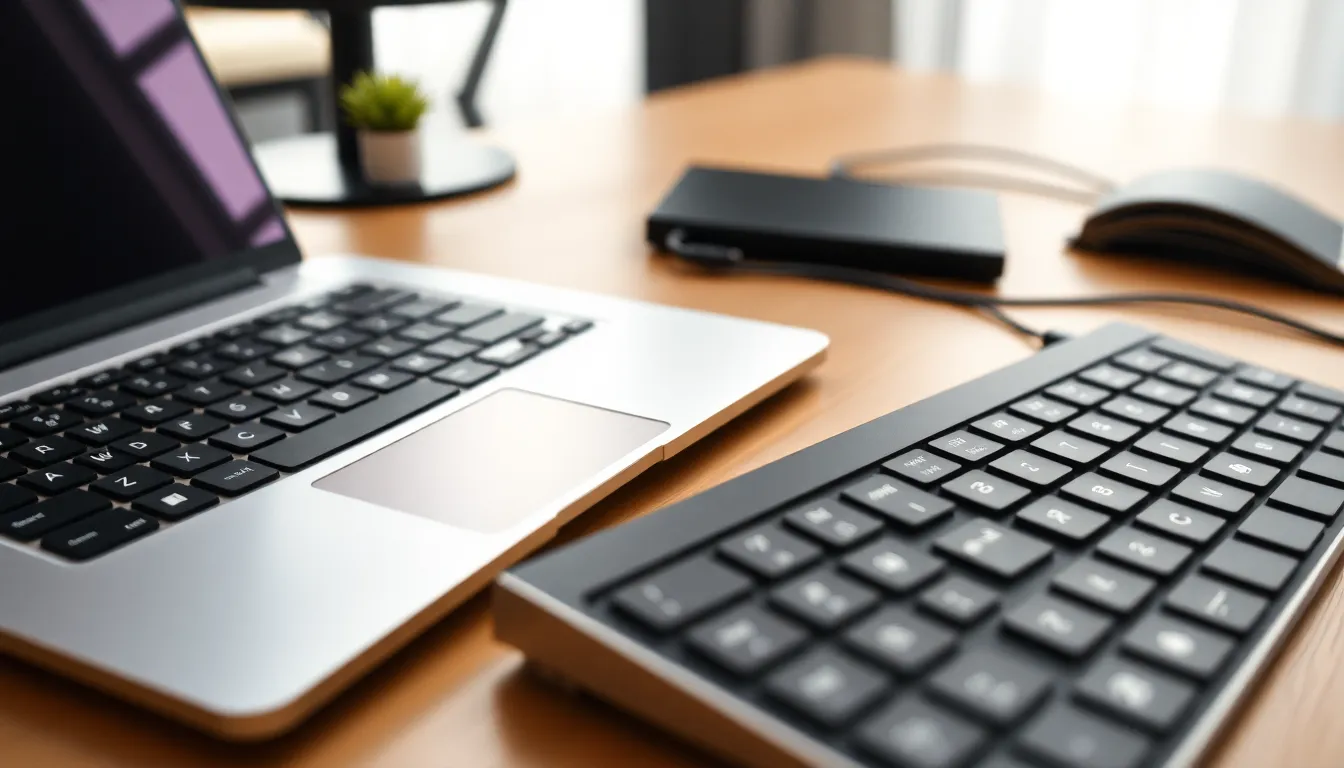Table of Contents
ToggleIn today’s fast-paced digital world, a responsive laptop keyboard can make all the difference in productivity and user experience. Whether typing up an important report or engaging in a lively chat, the feel and responsiveness of the keys play a crucial role in how efficiently one can work.
With advancements in technology, laptop keyboards have evolved significantly, offering features like tactile feedback, customizable layouts, and varying key travel distances. These innovations not only enhance comfort but also cater to diverse typing preferences. Understanding the importance of a responsive keyboard can help users make informed decisions when choosing their next laptop, ensuring it meets their needs for both work and leisure.
Overview of Responsive Laptop Keyboards
Responsive laptop keyboards play a crucial role in enhancing productivity and ensuring a comfortable typing experience. These keyboards combine specific features to cater to diverse user preferences.
Definition and Importance
Responsive laptop keyboards refer to those that provide immediate feedback upon keystrokes, ensuring that users can type efficiently and accurately. Their importance lies in minimizing typing fatigue, improving speed, and enhancing overall user satisfaction. A well-designed keyboard can reduce strain on fingers and wrists, making it vital for professionals and students who spend long hours typing.
Key Features to Look For
- Tactile Feedback: Tactile feedback allows users to feel the actuation of keys, aiding in typing accuracy.
- Key Travel Distance: Key travel distance varies among keyboards; an ideal range is typically between 1.5 mm to 2 mm, balancing comfort and response time.
- Layout Customization: Layout customization options enable users to tailor keyboard configurations for specific tasks or workflows.
- Backlighting: Backlighting enhances visibility in low-light environments, allowing for easier typing.
- Durability: Durability ensures longevity; look for keyboards that withstand extensive use without key degradation.
- Noise Level: Noise level affects the typing experience; quieter keyboards are often preferred in shared environments.
- Ergonomic Design: Ergonomic designs reduce strain and promote natural hand positioning, essential for prolonged use.
Types of Responsive Laptop Keyboards

Responsive laptop keyboards can be categorized based on their construction and design features. Understanding these types helps users identify the best fit for their typing preferences and requirements.
Mechanical vs. Membrane Keyboards
- Mechanical Keyboards: Mechanical keyboards utilize individual mechanical switches for each key. These switches provide tactile feedback and vary in actuation force and travel distance. This type excels in durability and responsiveness, making it ideal for users who prefer precise keystrokes and enjoy a tactile typing experience.
- Membrane Keyboards: Membrane keyboards consist of layers of pressure pads under the key surface. Each keystroke compresses a membrane, registering input. While typically quieter and more affordable than mechanical keyboards, membrane keyboards may not offer the same level of tactile feedback and durability. Users seeking a softer touch often prefer this option.
Chiclet Keyboards and Their Advantages
- Chiclet Keyboards: Chiclet keyboards feature flat keys with space between them, resembling the shape of chewing gum. This design enhances aesthetic appeal and promotes easier cleaning due to the gaps between keys.
- Advantages: Chiclet keyboards typically provide a comfortable typing experience with a low-profile design. This style allows for smoother fingertip movement and reduces accidental keystrokes. Many chiclet models also incorporate island-style keys, which help in accurately positioning the fingers while typing.
By understanding these types of responsive laptop keyboards, users can make informed choices that enhance their overall typing experience.
Factors Affecting Responsiveness
Responsive laptop keyboards depend on several critical factors that influence how efficiently they translate user input into action.
Key Travel and Actuation Points
Key travel and actuation points significantly impact typing responsiveness. Key travel refers to the distance a key moves when pressed. An ideal key travel distance ranges from 1.5 mm to 2 mm, promoting a balance between tactile feedback and comfort. Actuation points represent the specific point where pressing a key registers a keystroke. A well-defined actuation point enhances typing accuracy and speed, allowing users to type quickly without bottoming out. Keyboards with shorter actuation distances, typically around 1.0 mm, facilitate quicker response times, suitable for fast-paced typists.
Material Quality and Durability
Material quality directly influences keyboard durability and responsiveness. High-quality materials, such as ABS plastic or aluminum, increase structural integrity and provide a solid typing experience. Key switches made from durable components enhance longevity while maintaining performance. Additionally, spill-resistant coatings protect against liquid damage, ensuring consistent functionality over time. Well-constructed keyboards withstand wear and tear, helping users maintain reliability in demanding environments. Users benefit from keyboards that resist fading and wear, which enhances their tactile experience.
Popular Brands and Models
Several brands excel in producing responsive laptop keyboards, catering to both performance-oriented users and budget-conscious consumers. Notable options can enhance the typing experience across different needs.
High-Performance Options
- Razer Blade Series
Razer’s Blade laptops feature mechanical keyboards known for their tactile feedback and customizable RGB backlighting. The key travel distance of 1.5 mm enhances responsiveness, making them ideal for gamers and professionals alike.
- Apple MacBook Pro
The MacBook Pro showcases a chiclet keyboard with a refined butterfly mechanism, offering a stable and precise typing experience. Users appreciate its consistent key travel and backlit functionality, ensuring usability in various lighting conditions.
- Dell XPS Series
Dell’s XPS laptops are equipped with responsive chiclet keyboards that provide excellent travel distance. The keys are designed for durability and accuracy, catering to those who spend long hours typing or demanding productivity tasks.
- Lenovo ThinkPad
The ThinkPad series is renowned for its robust and user-friendly keyboards. The keys offer 1.8 mm of key travel and tactile feedback, making them highly favored by professionals for extended typing sessions.
Budget-Friendly Choices
- Acer Aspire Series
The Acer Aspire laptops come with membrane keyboards that provide a quiet typing experience. Though not as tactile as mechanical options, the responsiveness and overall comfort meet the needs of casual users.
- HP Pavilion Series
HP’s Pavilion series features chiclet keyboards designed for affordability while maintaining decent typing feedback. The key layout supports easy navigation, ideal for students and home office users.
- ASUS VivoBook
ASUS VivoBook laptops offer a solid and responsive typing experience at a competitive price point. The keyboards include well-spaced keys, making them suitable for everyday use and light productivity tasks.
- Samsung Galaxy Book
Samsung’s Galaxy Book series includes keyboards that balance responsiveness with portability. Although more compact, the keys provide a satisfactory typing experience for users looking for an economical option.
User Experience and Feedback
User experience with responsive laptop keyboards often hinges on factors such as typing comfort, ergonomics, and gaming performance. Feedback from users highlights notable differences in satisfaction levels based on individual preferences and requirements.
Typing Comfort and Ergonomics
Typing comfort ranks highly among user priorities. Keyboards that measure between 1.5 mm and 2 mm in key travel typically enhance typing ease. Users report reduced finger fatigue when fitted with tactile feedback mechanisms. Ergonomic designs, such as sloped surfaces and concave key shapes, further support natural hand positioning, minimizing wrist strain during extended typing sessions. Additionally, customizable layouts allow users to adjust key configurations, tailoring the experience to specific tasks, which contributes to overall typing efficiency.
Gaming Performance
Gaming performance also influences user feedback on responsive keyboards. High-performance laptops with mechanical keys offer rapid actuation points, promoting quick reactions in fast-paced gaming environments. Users prefer keyboards with anti-ghosting features, ensuring that multiple key presses register simultaneously without lag. Backlighting options appeal to gamers, providing visibility in low-light settings. Overall, responsive laptop keyboards that cater to both casual and competitive gamers enhance gameplay and user satisfaction through superior responsiveness and reliability.
Choosing a responsive laptop keyboard is essential for anyone seeking to enhance their productivity and typing comfort. With advancements in technology providing options tailored to various preferences it’s easier than ever to find the right fit.
Whether opting for a mechanical, membrane, or chiclet design each type offers unique benefits that cater to different needs. Features like tactile feedback, key travel distance, and ergonomic design play significant roles in improving the overall typing experience.
Investing time in selecting the right keyboard can lead to increased efficiency and satisfaction whether for work or gaming. Prioritizing personal comfort and functionality will ultimately make a noticeable difference in daily tasks.





